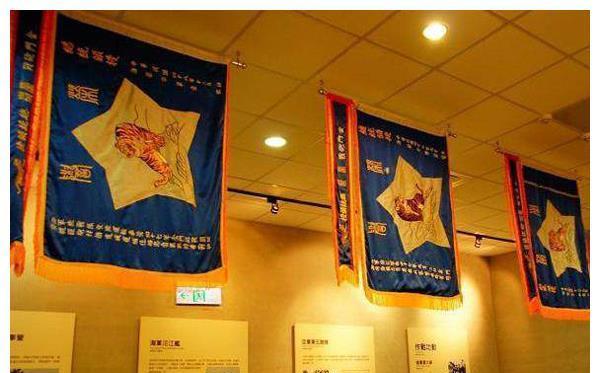The history inn introduced the "Qingtian White Sun Medal" and the "National Light Medal", both of which were the highest honors of "defending the family and defending the country and resisting foreign humiliation" during the War of Resistance.
However, both medals were awarded to individuals, and during the War of Resistance, there was also a collective highest honor, the "Flying Tiger Flag".

Flying Tiger Flag began in 1935,
"All troops, ships, air forces or fortresses shall be awarded to those who have made meritorious contributions in battletime with special merits in wartime."
By 1949, a total of 192 people had been awarded the Order of the Blue Sky and White Sun, but only 20 teams had won the Flying Tiger Flag, so if you can get this flag, it is definitely a proud lifetime of glory.
So, how strict are the criteria for awarding the Flying Tiger Flag? We won't list those boring data, just look at these to know -
No one won the fiercest Battle of Songhu, no one won the most brilliant Victory of Taierzhuang, and no one won the largest Battle of Wuhan... It wasn't until 1940 that someone finally got a "flying tiger flag." Moreover, what is unexpected is that the recipient of the first Flying Tiger Banner is neither the concubine of Lao Jiang nor a famous general with great merit, but a small battalion of Yan Xishan.
It was March 1940, when Fu Zuoyi, commander of the 35th Army, led his troops to launch the Battle of Wuyuan in Suiyuan, which finally eliminated all the Japanese puppet troops occupying Wuyuan City and recovered Wuyuan, setting a precedent for recovering lost land during the War of Resistance.
During the battle, Zhao Shoujiang, commander of the 1st Battalion of the 95th Regiment of the newly organized 32nd Division, led the 1st Battalion to serve as a commando and launched a street battle with the enemy, advancing house by house, and every step forward would pay a blood price, and finally even the battalion commander Zhao Shoujiang was heroically sacrificed. However, the soldiers of the 1st Battalion did not retreat, shouted the slogan of avenging the battalion commander, continued to fight, and finally rushed into the enemy headquarters, making the first contribution to the great victory of Wuyuan.
Because this campaign set a precedent for recovering lost land during the War of Resistance Against Japanese Aggression and greatly boosted the morale of the Chinese War of Resistance, the government awarded the battalion the first "Flying Tiger Banner", which was also the only battalion-level unit to receive the Flying Tiger Banner during the War of Resistance.
Everyone knows the big name of the 74th Army, the head of the five main forces, the trump card in the ace, of course, this honor is not in vain, in less than two years, even took 4 flying tiger flags, becoming the most flying tiger flags.
Of the 4 Flying Tiger Flags, 3 were obtained at the Battle of Changde. In the Battle of Changde, Yu Chengwan, commander of the 57th Division of the 74th Army, led 8,000 tigers and 30,000 elite anti-Japanese troops, and defended Changde with flesh and blood for 12 days, and finally only 83 people were left in the whole division, which was one of the most tragic battles in the eight-year War of Resistance.
After the war, the 74th Army Command, the 57th Division and the Artillery Regiment were awarded three Flying Tiger Flags, and the Artillery Regiment was also the only regimental unit to receive the Flying Tiger Banner in the War of Resistance.
Regarding the performance of the 74th Army Artillery Regiment in the Battle of Changde, the inn has introduced it before, which is very touching, and now intercept a small section of it -
After the fall of Changde, in order to avoid the artillery falling into the hands of the Japanese army, the commander of the artillery regiment, Jin Dingzhou, ordered that all the cannons be blown up. The dozen or so soldiers left in the artillery regiment cried and begged the regimental commander not to blow it up, but what else could be done than blow it up? Adjutant Li Fenglin gritted his teeth and lit the fuse. When the fuse was about to burn out, suddenly, a dozen soldiers ran together, hugged the cannon tightly, and with a few loud noises, a dozen lives disappeared along with the cannon...
Li Fenglin's greatest wish was to return to his hometown in the northeast after the war, but after this incident, he never left Changde for the rest of his life. In his later years, Li Fenglin murmured, "Here are my brothers, there are my cannons, I can't go, I'm gone, who will accompany them?" ”
At this time, the commander of the 74th Army had been replaced by Shi Zhongcheng, and the original commander Wang Yaowu became the commander of the 4th Front, which was the main force of the battle.
The battle lasted 55 days, annihilated a total of 12,500 Japanese troops, and killed 7,817 people in our army, which was definitely a victory worthy of a big book in the eight-year War of Resistance, and also became a major turning point in our army's transition from defense to offense.
After the war, the 51st Division of the 74th Army was awarded the Flying Tiger Banner for its most outstanding performance, and the 74th Army also became the unit that received the most Flying Tiger Banner in the history of the Republic of China, worthy of the British name of the First Ace Army!